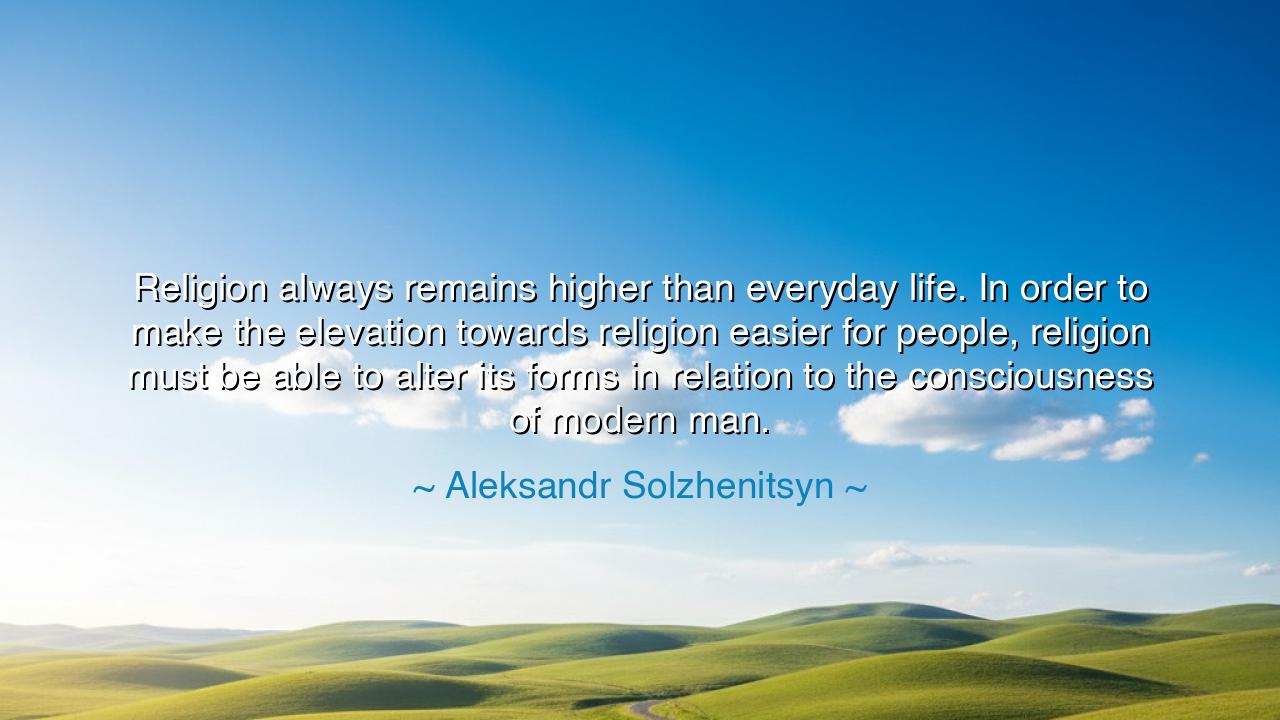
Religion always remains higher than everyday life. In order to
Religion always remains higher than everyday life. In order to make the elevation towards religion easier for people, religion must be able to alter its forms in relation to the consciousness of modern man.






In the vast expanse of human history, religion has always held a place of sacred reverence, often standing above the daily struggles of life as a guiding light for the human spirit. Yet, as the great Russian writer Aleksandr Solzhenitsyn profoundly observes, “Religion always remains higher than everyday life. In order to make the elevation towards religion easier for people, religion must be able to alter its forms in relation to the consciousness of modern man.” These words are a powerful reminder that religion, while eternal in its truth, must also be adaptive to the changing circumstances of each era, reaching beyond tradition to speak to the heart of the modern world. It is not enough for faith to remain static—it must evolve with the human spirit to guide us through the complexities of each new age.
Solzhenitsyn’s reflection speaks to the timeless nature of religion, and its place in human life. Religion is not merely a set of rituals or beliefs but a transcendent force that elevates human consciousness, pulling us out of the mundane and into something greater—a sense of connection to the divine, to the universe, and to one another. From the ancient Egyptians, who built towering temples to honor their gods, to the Greeks, who believed that the divine manifested itself in every aspect of life, religion was understood as an essential force that transcended the ordinary. Solzhenitsyn, however, calls for a deeper understanding: that religion, in its higher form, must remain relevant to the world in which we live, evolving to meet the challenges and complexities of modern life.
One could look to the history of Christianity to see the tension between eternal truths and the evolving consciousness of man. The early church fathers, such as St. Augustine and St. Thomas Aquinas, worked to reconcile Christian doctrine with the intellectual currents of their time, whether it be the philosophy of Plato or the emerging ideas of medieval scholasticism. In doing so, they created a bridge between ancient spiritual truths and the intellectual inquiries of the day, allowing Christianity to adapt without compromising its core beliefs. This balance between tradition and modernity is precisely what Solzhenitsyn points to—the idea that religion must evolve in response to the ever-changing mind and heart of man. Religion cannot remain locked in the past, but must speak to the modern soul, offering wisdom and guidance that resonates with the struggles and questions of the present.
Consider the example of Martin Luther, whose Reformation challenged the Catholic Church of his time. Luther’s 95 Theses, which criticized the corruption and abuses within the Church, were not an attack on faith itself, but an attempt to purify and reform the church to make it more aligned with the true spirit of Christian teachings. Through this act of bold reform, Luther sought to bring Christianity into alignment with the intellectual and moral needs of the time, much like Solzhenitsyn advocates for the adaptation of religion to modern consciousness. Luther understood that the truths of faith must remain unchanged, but their expressions—the way they are lived and practiced—must evolve with the times to maintain their relevance and power.
In Solzhenitsyn’s view, religion serves as a moral compass that guides humanity through the darkness of materialism, individualism, and despair—but for this guiding light to continue to lead, it must speak in ways that modern man can understand and relate to. This does not mean changing the essence of religion, but finding ways to express its timeless wisdom in ways that resonate with contemporary experiences. For instance, Buddhism, with its core teachings of suffering, impermanence, and compassion, has been able to adapt to the modern world by focusing on practices such as mindfulness and meditation, which are now widely embraced in the West as tools for managing stress and seeking inner peace. These adaptations make the teachings more accessible to modern minds without sacrificing their depth or truth.
The lesson in Solzhenitsyn’s words is that religion must be both eternal and relevant—rooted in ancient truths but also alive to the needs of the present. Just as the great philosophers of antiquity sought to make the divine more understandable to the human mind, we, too, must strive to translate the wisdom of religion into forms that speak directly to the struggles and aspirations of modern society. This is not a betrayal of faith, but a fulfillment of it—ensuring that its light continues to shine brightly in the hearts of those who need it most. It is the duty of the faithful, as it was in the time of the church fathers, to keep the fire of divine truth burning while adapting its expression to the world in which we live.
In our own lives, we must ask ourselves how we can make the higher truths of faith accessible and relevant to the world around us. Are we living in a way that allows the spirit of religion to meet the challenges of the modern world? Are we finding ways to bridge the ancient with the present, making the wisdom of the ages available to the minds and hearts of those around us? Solzhenitsyn’s call is not just for religion to evolve, but for us, as individuals, to live out our faith in ways that resonate with the modern soul, lifting it toward the higher truths that can guide us toward meaning and purpose. Let us walk this path with both humility and wisdom, ever ready to adapt, to learn, and to grow while remaining faithful to the eternal truths that have always guided the human spirit.






AAdministratorAdministrator
Welcome, honored guests. Please leave a comment, we will respond soon